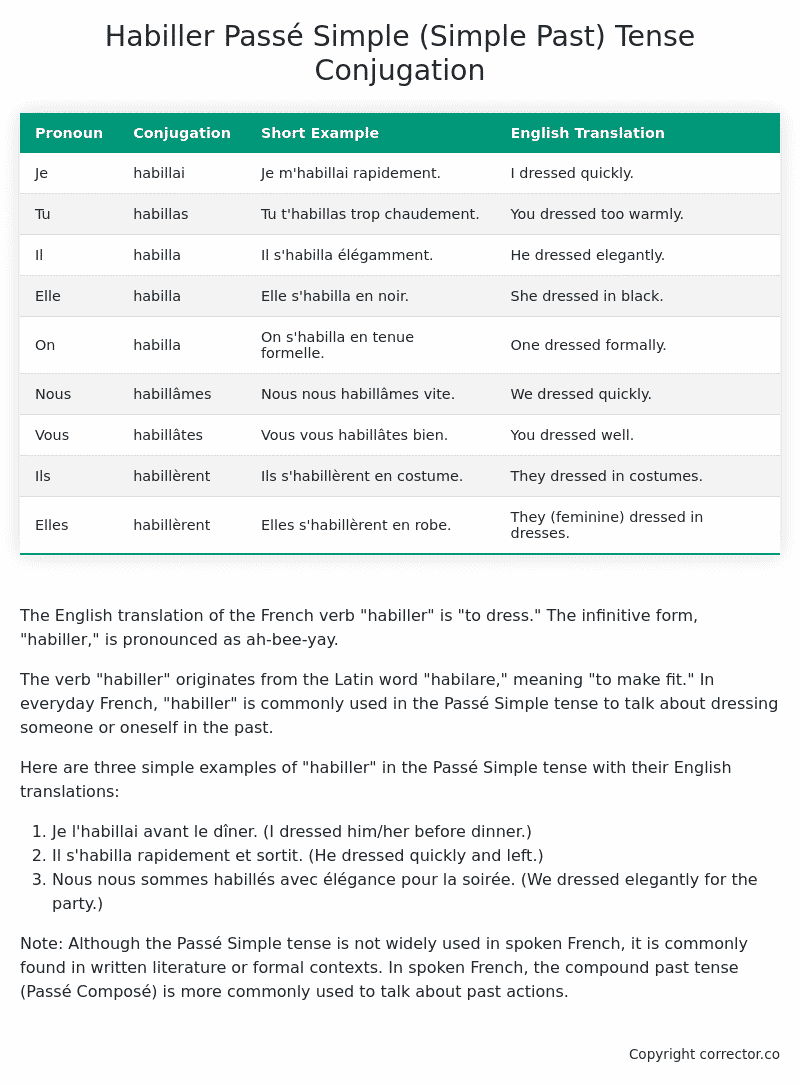Passé Simple (Simple Past) Tense Conjugation of the French Verb habiller
Introduction to the verb habiller
The English translation of the French verb “habiller” is “to dress.” The infinitive form, “habiller,” is pronounced as ah-bee-yay.
The verb “habiller” originates from the Latin word “habilare,” meaning “to make fit.” In everyday French, “habiller” is commonly used in the Passé Simple tense to talk about dressing someone or oneself in the past.
Here are three simple examples of “habiller” in the Passé Simple tense with their English translations:
- Je l’habillai avant le dîner. (I dressed him/her before dinner.)
- Il s’habilla rapidement et sortit. (He dressed quickly and left.)
- Nous nous sommes habillés avec élégance pour la soirée. (We dressed elegantly for the party.)
Note: Although the Passé Simple tense is not widely used in spoken French, it is commonly found in written literature or formal contexts. In spoken French, the compound past tense (Passé Composé) is more commonly used to talk about past actions.
Table of the Passé Simple (Simple Past) Tense Conjugation of habiller
| Pronoun | Conjugation | Short Example | English Translation |
|---|---|---|---|
| Je | habillai | Je m’habillai rapidement. | I dressed quickly. |
| Tu | habillas | Tu t’habillas trop chaudement. | You dressed too warmly. |
| Il | habilla | Il s’habilla élégamment. | He dressed elegantly. |
| Elle | habilla | Elle s’habilla en noir. | She dressed in black. |
| On | habilla | On s’habilla en tenue formelle. | One dressed formally. |
| Nous | habillâmes | Nous nous habillâmes vite. | We dressed quickly. |
| Vous | habillâtes | Vous vous habillâtes bien. | You dressed well. |
| Ils | habillèrent | Ils s’habillèrent en costume. | They dressed in costumes. |
| Elles | habillèrent | Elles s’habillèrent en robe. | They (feminine) dressed in dresses. |
Other Conjugations for Habiller.
Le Present (Present Tense) Conjugation of the French Verb habiller
Imparfait (Imperfect) Tense Conjugation of the French Verb habiller
Passé Simple (Simple Past) Tense Conjugation of the French Verb habiller (You’re reading it right now!)
Passé Composé (Present Perfect) Tense Conjugation of the French Verb habiller
Futur Simple (Simple Future) Tense Conjugation of the French Verb habiller
Futur Proche (Near Future) Tense Conjugation of the French Verb habiller
Plus-que-parfait (Pluperfect) Tense Conjugation of the French Verb habiller
Passé Antérieur (Past Anterior) Tense Conjugation of the French Verb habiller
Futur Antérieur (Future Anterior) Tense Conjugation of the French Verb habiller
Subjonctif Présent (Subjunctive Present) Tense Conjugation of the French Verb habiller
Subjonctif Passé (Subjunctive Past) Tense Conjugation of the French Verb habiller
Subjonctif Imparfait (Subjunctive Imperfect) Tense Conjugation of the French Verb habiller
Subjonctif Plus-que-parfait (Subjunctive Pluperfect) Tense Conjugation of the French Verb habiller
Conditionnel Présent (Conditional Present) Tense Conjugation of the French Verb habiller
Conditionnel Passé (Conditional Past) Tense Conjugation of the French Verb habiller
Conditionnel Passé II (Conditional Past II) Tense Conjugation of the French Verb habiller
L’impératif Présent (Imperative Present) Tense Conjugation of the French Verb habiller
L’impératif Passé (Imperative Past) Tense Conjugation of the French Verb habiller
L’infinitif Présent (Infinitive Present) Tense Conjugation of the French Verb habiller
L’infinitif Passé (Infinitive Past) Tense Conjugation of the French Verb habiller
Le Participe Présent (Present Participle) Tense Conjugation of the French Verb habiller
Le Participe Passé (Past Participle) Tense Conjugation of the French Verb habiller
Struggling with French verbs or the language in general? Why not use our free French Grammar Checker – no registration required!
Get a FREE Download Study Sheet of this Conjugation 🔥
Simply right click the image below, click “save image” and get your free reference for the habiller Passé Simple tense conjugation!

Habiller – About the French Passé Simple (Simple Past) Tense
Formation
Usage
Narration
Historical Context
Interactions with other tenses
Passé Composé
Imparfait
Conditional and Subjunctive
Summary
I hope you enjoyed this article on the verb habiller. Still in a learning mood? Check out another TOTALLY random French verb conjugation!


